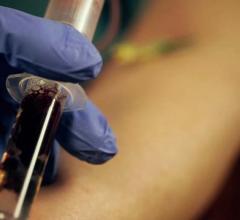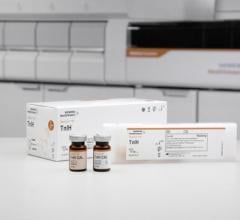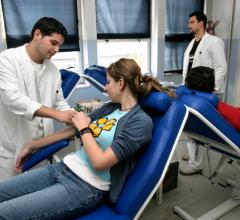
Kemal Akat and colleagues used sensitive RNA sequencing techniques to profile the abundance of microRNAs in samples from healthy people and those suffering from heart failure. They found three RNAs with potential for use as markers of heart injury.
August 12, 2014 — Like clues to a crime, specific molecules in the body can hint at exposure to toxins, infectious agents or even trauma, and therefore help doctors determine whether and how to treat a patient. In recent years, tiny pieces of RNA called microRNAs have captured scientific attention for their potential as markers of health and disease.
New research at Rockefeller University and Columbia University suggests these small molecules may be able to relay valuable information about damage to the heart. Scientists in Thomas Tuschl’s Laboratory of RNA Molecular Biology have linked an increase in certain microRNAs circulating in the blood with injury to cardiac muscle. The researchers hope that, one day, these molecules might provide the basis for a more sensitive diagnostic tool than those currently available.
“When we profiled the small RNAs circulating in the blood of healthy people versus heart failure patients, we found increases in levels of certain microRNAs expressed by muscle, including three known to originate only in the heart,” said Kemal Akat, the first author and a postdoctoral scholar in the lab. “Our research suggests these three microRNAs could be used as indicators of injury produced by anything from heart attack to an impact in a car accident.”
The findings were published online July 10 in the Proceedings of the National Academy of Sciences. These small RNA molecules are encoded in the genome, and they fine-tune the expression of genes in the cells that produce them. They also show up in the blood stream, outside the protective environment of the cell. Although microRNAs are present in blood at extremely low levels, the highly sensitive RNA sequencing techniques used by the Rockefeller team can detect them.
The researchers profiled the microRNA in samples of blood and heart tissue from healthy people and people suffering from one of two types of heart failure. They compared their microRNA results with those of a protein currently used to diagnose injury to heart muscle: cardiac troponin. This protein occurs within healthy heart muscle cells, but when injured, these cells leak cardiac troponin out into the blood stream, causing its levels to spike in circulation. Something similar appears to happen with microRNAs. The researchers found elevated levels of muscle-associated microRNAs in the blood but not in the heart tissue samples of the heart failure patients.
This similarity, as well as other evidence, suggests microRNAs could also serve as biomarkers for heart injury, and the researchers hope microRNAs could even have an advantage over cardiac troponin. “Cells contain a small pool of soluble cardiac troponin, but the majority is bound to heart muscle filaments. By contrast, the protein complexes that contain microRNA within the cell are fully soluble. For this reason, we suspect microRNAs may be more readily released into circulation and their levels may increase faster than cardiac troponin upon tissue injury,” Akat said.
“RNA sequencing can capture a wide spectrum of microRNAs and other potentially interesting RNA molecules from a tiny sample,” Tuschl said. “This opens the possibility of finding many promising biomarkers like those we found from heart muscle, leading to a more universal test then the current monitoring of single proteins. Some technological barriers must still be overcome before tests based on RNA biomarkers like these can be brought into the clinic, but the potential is there for an entirely new type of clinically important diagnostic tool.”
For more information: www.rockefeller.edu


 October 09, 2019
October 09, 2019 









